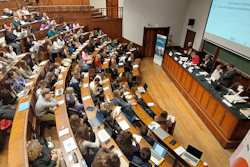The EU Member States and the European Commission have joined forces in establishing the European Universities Initiative as a means to future-proof higher education in Europe, the ultimate goal being a truly European Higher Education Area. In this context, the Polish National Agency for Academic Exchange provided a grant of 1.912.360 PLN (~440.000 Euro)to Jagiellonian University to boost and complement the activities funded by the European Commission as part of our 1Europe project. We have asked JU’s Vice-dean for International Relations Bartosz Brożek, and the Project coordinator, Marek Jakubiec, to tell us more about the DIGITALIZED! Project.
Which new elements will DIGITALIZED! bring to Una Europa?
BB: The main goal of the project is to intensify and enhance cooperation between the members of Una Europa, in particular in connection to the theoretical and practical challenges created by the development of new technologies for contemporary and future societies. All events will take place in Krakow, starting from autumn 2020 (we hope so!).
MJ: Within the project, Jagiellonian University will host numerous events. Researchers and PhD students from all the Una members will be invited to participate. Six different, innovative formats will be introduced: Una Masterclasses, Una Research Retreats, Una Mapping the Future Seminars, Una for Community, Una Talks, and Una MOOCs. Let me just briefly introduce three of them, by way of example.
Una Masterclasses are a few days’ meetings with world-leading scientists, entrepreneurs, science managers, and opinion-makers to discuss a selected, vital problem falling within the thematic scope of the project.
Una for Community are projects realised by Una Europa PhD students. In collaboration with local community leaders, students will work together to develop and implement community-related activities, educational tools, etc. The work will be organised in a ‘blended’ way, combining online and physical interactions.
Una Research Retreats are one-week meetings with a selected group of colleagues from Una Europa partner universities to work on a joint paper or a grant proposal.
What does the project mean for students, staff, academics, external partners?
MJ: I think the project will be a great opportunity for all researchers and PhD students who are interested in the problems that are linked to digitalization in different ways. They will be able to participate in the events that will allow them to initiate (or strengthen) cooperation with Una Europa partners, as well as to participate in ‘Una For Community’ projects. What is great: All the costs (flights, accommodation etc.) will covered by the Jagiellonian University.
BB: The general topic of the project (‘Society in the Era of Digital Revolution’) is further broken down into four sub-themes: (a) digital mind (how does the development of new technologies change the human mind?), (b) digital society (how do new technologies reshape communities?); (c) digital governance (how does technological development influence all forms of governance?); (d) digital economy (what is the impact of new technologies on the economy?). The thematic scope of the project will be interpreted broadly and inclusively, as well as in an inter- and transdisciplinary way, so numerous groups of researchers, students as well as external partners are invited to be involved.
How did the project come about? What was the process? Who were the key players?
BB: The project proposal was prepared by both of us. We decided to apply for a because we see tremendous potential for Una Europa and therefore wish to intensify cooperation between the Una Europa universities. We are also highly interested in the research concerning “future society” problems, many of which will be addressed by the events. We also know that our partners applied for different national funding, so our project is an additional “point on the Una projects map”, another, integral piece of the Una Europa jigsaw of complementary measures.



